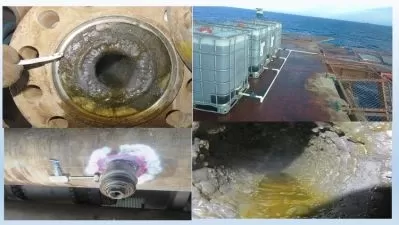Chartering and Managing Oil and Gas Tankers
Ayoola Ponle, Brightsea Resources
1:53:58
Description
Efficient Operations: Oil and Gas Tanker Chartering and Management
What You'll Learn?
- Gain insight into the process of chartering tankers
- Grasp the fundamentals of the oil and gas industry
- Learn about the factors that affect the tanker market
- Understand firm offers and counter-offers
- Learn about Worldscale and the calculations involved
- Learn details about LayCan. Laytime, Demurrage and Despatch
- Calculate Laytime and prepare Statement of Fact
- Learn about Notice of Readiness and when to tender NOR
- Enhance communication and negotiation skills relevant to tanker chartering
- Know the relevant organisations with the industry
Who is this for?
What You Need to Know?
More details
DescriptionEmbark on a voyage into the intricate world of oil and gas tanker chartering and management with our comprehensive course. As vital players in the global energy supply chain, oil and gas tankers are essential for transporting valuable resources across the seas. This course provides a deep dive into the strategies, logistics, regulations, and best practices that govern this dynamic industry.
Gain a comprehensive understanding of the various types of oil and gas tankers, their functionalities, and how they fit into the energy supply chain. Explore techniques for optimizing tanker operations and ensuring cost-effectiveness.
Learn the fundamentals of chartering, including negotiations, fixtures, contracts, and the role of brokers in securing profitable deals. Gain a foundational understanding of energy markets, the role of oil as a commodity, and its significance in the global economy. Explore the spot market, where physical oil transactions occur.
Explore the fundamental principles of Laytime, the time allocated for loading and unloading cargo. Learn how to calculate Laytime accurately, accounting for various factors like weather and cargo handling. Understand the significance of Laycan, the period during which the vessel must arrive, and how it impacts the Laytime calculation. Learn about Demurrage, and the charges incurred when Laytime is exceeded. Explore the concept of Despatch and the financial incentive for early cargo discharge.
Explore the Worldscale system, its history, and its role in standardizing freight rates for various tanker sizes and routes. Learn how to interpret Worldscale rates and assess their impact on shipping economics.
Examine the Notice Of Readiness process, its significance, and the legal implications of issuing a Notice of Readiness. Learn the critical timing and documentation requirements to ensure a smooth cargo operation.
Who this course is for:
- Beginners interested in chartering and management of oil and gas tankers
- Industry practitioners keen on expanding their knowledge
- Shipbrokers keen on deepening their understanding
Embark on a voyage into the intricate world of oil and gas tanker chartering and management with our comprehensive course. As vital players in the global energy supply chain, oil and gas tankers are essential for transporting valuable resources across the seas. This course provides a deep dive into the strategies, logistics, regulations, and best practices that govern this dynamic industry.
Gain a comprehensive understanding of the various types of oil and gas tankers, their functionalities, and how they fit into the energy supply chain. Explore techniques for optimizing tanker operations and ensuring cost-effectiveness.
Learn the fundamentals of chartering, including negotiations, fixtures, contracts, and the role of brokers in securing profitable deals. Gain a foundational understanding of energy markets, the role of oil as a commodity, and its significance in the global economy. Explore the spot market, where physical oil transactions occur.
Explore the fundamental principles of Laytime, the time allocated for loading and unloading cargo. Learn how to calculate Laytime accurately, accounting for various factors like weather and cargo handling. Understand the significance of Laycan, the period during which the vessel must arrive, and how it impacts the Laytime calculation. Learn about Demurrage, and the charges incurred when Laytime is exceeded. Explore the concept of Despatch and the financial incentive for early cargo discharge.
Explore the Worldscale system, its history, and its role in standardizing freight rates for various tanker sizes and routes. Learn how to interpret Worldscale rates and assess their impact on shipping economics.
Examine the Notice Of Readiness process, its significance, and the legal implications of issuing a Notice of Readiness. Learn the critical timing and documentation requirements to ensure a smooth cargo operation.
Who this course is for:
- Beginners interested in chartering and management of oil and gas tankers
- Industry practitioners keen on expanding their knowledge
- Shipbrokers keen on deepening their understanding
User Reviews
Rating
Ayoola Ponle, Brightsea Resources
Instructor's Courses
Udemy
View courses Udemy- language english
- Training sessions 25
- duration 1:53:58
- Release Date 2023/12/13











